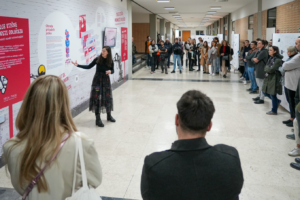In the rapidly evolving landscape of new and emerging technologies, TechEthos is set to captivate audiences across Europe with a series of original installations, focusing on two technology families: Digital Extended Reality and Climate Engineering. Designed to leave an indelible mark on diverse audiences, starting from October, these interactive experiences will be displayed in the six science engagement organisations involved in the project. Whether visitors are experts in the field, teachers, students, or the general public, the goal is to foster a deep understanding of the ethical considerations that support the development, deployment, and impact of TechEthos technology families.
Building on the project’s Ethics by Design approach, the installation reflects the attitudes, concerns and values shared by the different stakeholders’ groups involved in the project. By emphasizing critical thinking, responsible research, and awareness of innovation’s impact, we aim to make the complex world of emerging technologies relatable, personal, and empowering to the public.
Through our installations, we invite you to explore the interactive displays, reflect on your values and be part of the conversation. Our well-thought and attractive design will serve as a gateway to a world where ethics should not be an afterthought but an integral part of technological progress. For a more interactive experience, the TechEthos setups incorporate digital elements like stand-alone screens and hands-on activities. Designated discussion corners will invite visitors to investigate deeper technology-related issues, fostering an environment of engagement and critical discourse. Workshops and conferences, featuring guest experts, add another layer to the overall experience.


Until December 17, the Center for the Promotion of Science gives the opportunity to learn more about the functioning of chatbots, and the social and ethical challenges brought by emerging technologies, like natural language processing (University of Belgrade Faculty of Philosophy)
TechEthos installations are not just exhibits — they are gateways to an ideal future where technology and ethics converge. Do not just witness the future, but contribute to shaping it at a TechEthos installation near you!
Check out the upcoming installations
- Romania, Bucharest – National Museum of Geology – October 2023
- Liberec, Czechia – iQLANDIA – November 2023
- Belgrade, Serbia – University of Belgrade: Faculty of Philosophy – October-December 2023
- Austria, Vienna – ScienceCenter Network – September-December 2023
- Granada, Spain – Parque de las Ciencias – November-April 2023
- Umeå, Sweden – Curiosum Science Centre – November 2023
Are you looking forward to learning more about emerging technologies? Get to know the science engagement organisations behind our installations.
Too far from our installations? Embark on Y/our Ethics Digital Installation here!
To learn more about TechEthos follow the project on Twitter and LinkedIn, and sign up to the project newsletter. By joining the online community, you will be first in line to discover the technologies the project selects as the focus of its work and contribute to shaping the technologies of the future.





















